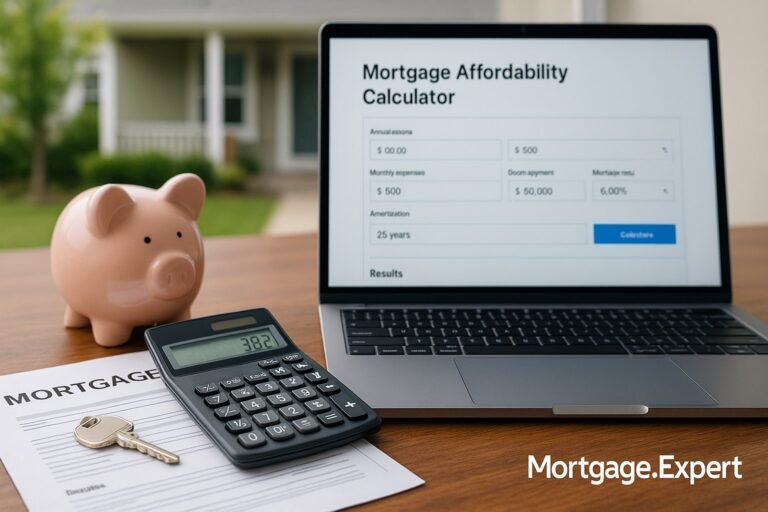
First-Time Home Buyer Mortgage Guide (2025 Edition)
Thinking about buying your first home in Canada? It’s exciting—but also overwhelming. From rates and down payments to insurance and government programs, there’s a lot to figure out. That’s why we created this complete, plain-English guide to help first-time homebuyers like you make confident decisions and avoid costly mistakes.
We’ll walk you through everything from mortgage basics and pre-approval to stress testing and closing costs—plus the federal and provincial rebates that could save you thousands. Let’s dive in!
What Are the Criteria for First-Time Homebuyers in Canada?
To qualify as a first-time homebuyer in Canada:
- You (or your spouse/common-law partner) must not have owned or lived in a home owned by either of you in the past 4 years.
- You can be reclassified as a first-time buyer if you’ve returned to renting, are recently separated, or haven’t owned a home jointly in that time frame.
Each program (like CMHC insurance, Home Buyers’ Plan, and land transfer tax rebates) may define “first-time buyer” differently—so double-check the eligibility rules for each.
Mortgage Basics for First-Time Buyers
A mortgage is a loan secured against the home you buy. You repay it over 25–30 years in monthly or biweekly instalments. There are two common types of mortgages in Canada:
- Standard charge mortgage – easier to switch lenders at renewal
- Collateral charge mortgage – allows borrowing more later, but harder to transfer
The term “conventional mortgage” means you put down 20% or more and don’t need insurance. If you put down less than 20%, it becomes a high-ratio mortgage and must be insured.
Down Payments: What You Need to Know
You need a minimum 5% down for homes under $500K. Between $500K and $999K? It’s 5% on the first $500K and 10% on the rest. Homes over $1 million require 20% minimum.
Putting down less than 20% means you’ll pay for mortgage insurance—but you may actually qualify for a better rate.
| Home Price | Minimum Down Payment | Percentage | CMHC Insurance Needed? |
|---|---|---|---|
| $500,000 | $25,000 | 5% | ✅ Yes |
| $750,000 | $50,000 | 6.7% | ✅ Yes |
| $1,000,000 | $200,000 | 20% | ❌ No (Not eligible) |
How the Mortgage Pre-Approval Process Works
Before you start house hunting, it’s smart to get pre-approved. This tells you how much mortgage you can qualify for and gives you a rate hold (usually for 90–120 days). It also shows sellers you’re serious.
| Step | What Happens |
|---|---|
| 1. Application | You submit your income, debts, credit info, and employment details. No home needs to be selected yet. |
| 2. Review | Your mortgage advisor reviews your info and offers advice based on your credit profile. |
| 3. Verification | You provide documents (paystubs, ID, NOA, etc.) to confirm the details in your application. |
| 4. Underwriting | The lender checks for risk, validates the application, and decides what you qualify for. |
| 5. Pre-Approval Letter | You receive a letter with your rate hold and budget limit—good for 90–120 days. |
💡 Tip: Don’t mistake pre-approval for a guaranteed mortgage. Final approval happens only after you choose a home and the lender reviews that property.
Fixed vs Variable Rate: Which One’s Better?
Fixed Rate
With a fixed-rate mortgage, your interest rate stays the same throughout your term (usually 1 to 5 years). It’s tied to government bond yields, which means it’s more stable and predictable.
Best for: First-time buyers who want budgeting certainty and peace of mind.
Variable Rate
A variable rate mortgage changes as the lender’s prime rate changes, which follows the Bank of Canada’s policy rate. It often starts lower than fixed, but it can fluctuate up or down.
Best for: Buyers who are comfortable with some risk or who believe rates will drop.
| Year | 5-Year Fixed Rate | 5-Year Variable Rate |
|---|---|---|
| 2015 | 2.79% | 2.25% |
| 2020 | 2.04% | 1.30% |
| 2023 | 5.24% | 5.85% |
| 2025 (est.) | 4.69% | 5.10% |
Mortgage Term vs Amortization: What’s the Difference?
- Term = how long your contract and interest rate are locked in (typically 1–5 years)
- Amortization = how long it will take you to pay off the loan completely (typically 25 or 30 years)
Shorter amortization saves you interest in the long run. But a longer amortization gives you smaller monthly payments.
| Amortization | Monthly Payment | Total Interest Paid |
|---|---|---|
| 25 Years | $2,976 | $392,835 |
| 30 Years | $2,729 | $482,286 |
Should You Choose an Open or Closed Mortgage?
Here’s the simplest way to think about it:
- An open mortgage gives you flexibility. You can pay it off anytime without penalties—but it comes with a higher rate.
- A closed mortgage offers lower interest rates but charges fees if you break the contract early.
Most first-time buyers choose closed mortgages because they’re cheaper. But if you plan to sell, refinance, or pay off the loan soon, an open option might make more sense.
📌 Open vs Closed Mortgage: Ask Yourself These 3 Questions
Use this quick filter to figure out which mortgage type matches your goals.
⏳ 1. Do you plan to stay in the home for at least 5 years?
Yes → Closed mortgage is likely better.
No → Open mortgage offers more flexibility.
💰 2. Will you make big lump-sum payments or refinance early?
Yes → Open mortgage helps you avoid penalties.
No → Closed mortgage can save you money.
📉 3. Want the lowest interest rate, even if it limits flexibility?
Yes → Closed mortgage usually offers lower rates.
No → Open mortgage lets you adapt as needed.
🧠 Tip: If you answered YES to 2 or more open-friendly questions, consider an open mortgage. Otherwise, a closed mortgage may suit you better.
- Will I stay in the home at least 5 years?
- Am I planning any major lump-sum payments?
- Do I need flexibility more than a low rate?
Understanding CMHC Mortgage Insurance (Default Insurance)
If your down payment is under 20%, your mortgage must be insured by one of Canada’s three major providers:
- CMHC (Canada Mortgage and Housing Corporation)
- Sagen (formerly Genworth)
- Canada Guaranty
The premium is added to your mortgage, not paid upfront. It protects the lender—not you—in case you default.
| Down Payment | Insurance Premium |
|---|---|
| 5%–9.99% | 4.00% |
| 10%–14.99% | 3.10% |
| 15%–19.99% | 2.80% |
| 20% or more | ❌ Not required |
What Is the Mortgage Stress Test?
Canada’s mortgage stress test ensures you can still afford your payments if rates rise. Even if your rate is 4.99%, you must qualify as if it were:
- 5.25%, or
- Your actual rate + 2% (whichever is higher)
This impacts how much you can borrow. Many buyers are surprised to learn they qualify for less than expected.
🧪 Mortgage Stress Test Calculator
Check if you qualify based on Canadian stress test rules (higher of 5.25% or contract rate + 2%).
Should You Use a Mortgage Broker or Bank?
Both can get you a mortgage—but their approach is different.
Bank = Offers their own in-house products
Broker = Shops multiple lenders (including banks) for you
Brokers often help first-time buyers qualify with flexible lenders, better rates, and more personalized guidance.
| Feature | Bank | Mortgage Broker |
|---|---|---|
| Lender Options | Only their own | Dozens of lenders |
| Interest Rates | Usually higher | Often lower |
| Service Level | Standardized | Personalized |
| Best For | Existing clients with clean files | New buyers, self-employed, newcomers |
What Incentives Are Available for First-Time Homebuyers in Canada?
If you’re buying your first home, Canada offers several programs to reduce your upfront and long-term costs.
| Program | What It Does | Max Benefit | Who Qualifies? |
|---|---|---|---|
| 🏦 RRSP Home Buyers’ Plan (HBP) | Withdraw up to $60K tax-free from RRSP | $60,000 | First-time buyers with RRSP |
| 🏡 First-Time Home Buyer Tax Credit | Claim $10K credit on taxes owed | $1,500 | All first-time buyers |
| 🔄 Land Transfer Tax Rebates | Get a partial/full rebate on LTT | Up to $8,475 (ON + TO) | Residents of ON, BC, PEI, etc. |
| 💼 First Home Savings Account (FHSA) | Save up to $8K/yr tax-free | $40,000 lifetime | Canadian residents 18–71 |
💡 Tip: You can often combine these programs for maximum impact—e.g. use your FHSA and HBP together.
Sample Closing Costs Breakdown (Ontario Example)
Let’s say you’re buying a $500,000 home in Ontario with 5% down. Here’s what your closing costs might look like:
| Expense | Estimated Cost |
|---|---|
| Land Transfer Tax | $6,475 (minus $4K rebate) |
| Legal Fees & Disbursements | $1,500–$2,000 |
| Home Inspection | $300–$500 |
| Title Insurance | $250–$500 |
| Appraisal Fee | $350–$600 (if needed) |
| CMHC Insurance (added to mortgage) | $19,000 (approx.) |
💡 Pro tip: Set aside 1.5%–4% of your purchase price to cover these costs without surprises.
Final Thoughts: Your First Mortgage Journey Starts Here
Buying your first home is a big deal. It’s also a long process that rewards preparation. If you take the time to:
- Understand your affordability
- Learn the mortgage terms
- Work with the right experts
- Use the rebates available to you
…you’ll be in a great position to buy confidently and avoid regrets later.
📞 Talk to a Canadian Mortgage Expert
Unsure about your options? Get personalized advice and a no-obligation pre-approval to start your homeownership journey.
Get Pre-Approved TodayStuck with a Mortgage Decision?
Don’t stress — our team is here to help. Reach out for free, no-obligation guidance.
Contact the Experts



